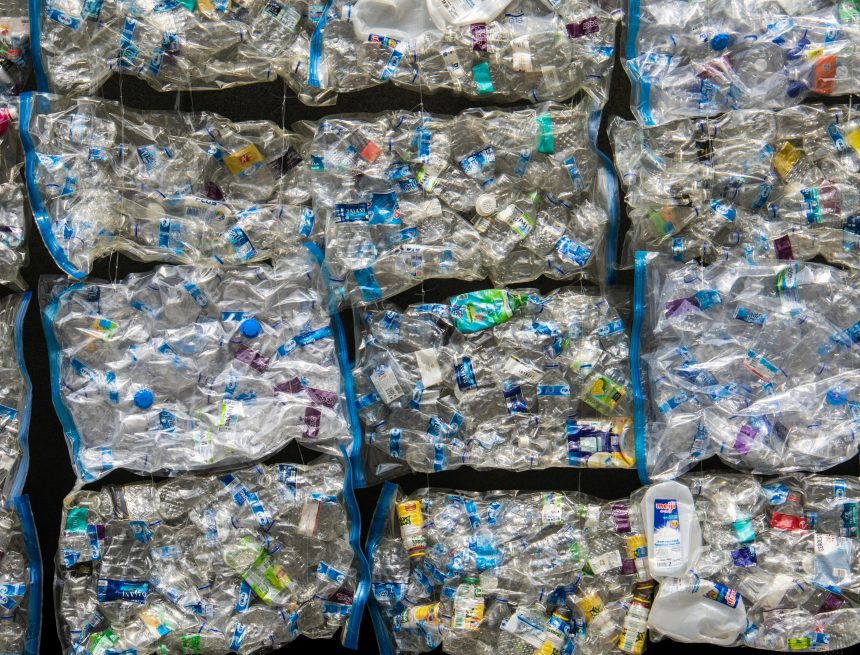Global cooperation is proving resilient even as multilateralism continues to face strong headwinds, according to the World Economic Forum’s Global Cooperation Barometer 2026. However, cooperation is below where it needs to be to address critical economic, security and environmental challenges. Dialogue is a critical factor in identifying pathways that advance shared interests.
Features

Commission takes measures to transition Europe to a circular economy
The European Commission has unveiled a first set of pilot actions to accelerate Europe's transition to a circular economy, with a particular focus on the plastics sector. The Commission says that by optimising the recycling of plastics, these measures will further unlock the potential of the Single Market and enhance the EU's economic security, strategic autonomy, competitiveness and environmental sustainability.

AI can solve development challenges: agriculture, health, education
Artificial intelligence is reshaping economies and societies at a remarkable pace, transforming how people learn, work and live. Its ability to unlock access to knowledge, boost productivity and open new markets holds immense potential to accelerate development, creating jobs, new industries and boosting economic transformation, says the World Bank's 'Digital Progress and Trends Report 2025: Strengthening AI Foundations'. It offers a comprehensive data-driven snapshot of the global AI landscape.

ZeroAvia completes financing to industrialise electric propulsion system
ZeroAvia has completed a further round of financing, led by Barclays Climate Ventures, Breakthrough Energy Ventures, Ecosystem Integrity Fund, Horizons Ventures, Summa Equity and AP Ventures, with participation from the National Wealth Fund and the Scottish National Investment Bank. With additional investment secured, ZeroAvia has extended its cash runway for the next two years and will continue to fully industrialize its hydrogen power and propulsion technology for the aviation market.
Updates
UN: global economy holding up but clouded by uncertainty
The global economy has shown resilience, but the outlook remains clouded by trade tensions, fiscal strains and persistent uncertainty, according to a United Nations report. Growth is expected to slow to 2.7% in 2026, below 2025 levels and the pre-pandemic average, as subdued investment and structural headwinds weigh on momentum despite easing inflation and monetary loosening.
World Bank: worldwide economy steady but developing economies struggling
The global economy is proving more resilient than anticipated despite persistent trade tensions and policy uncertainty, according to the World Bank’s latest Global Economic Prospects report. Global growth is projected to remain broadly steady over the next two years, easing to 2.6% in 2026 before rising to 2.7% in 2027, an upward revision from the June forecast.
FGS: The Global Radar 2026 reveals a world that is being rewired
The FGS Global Radar 2026 reveals a world that is being rewired - politically, economically, technologically and socially. Public pessimism is reaching crisis levels, divides are deepening, institutions that once moderated are losing their grip.
Oliver Wyman & Uni of California: Industry 5.0 is a driver of GDP
Industry 5.0 places human creativity and welfare, sustainability, and resilient systems at the centre of business and government strategies for the benefit of economies, societies and the planet. The combination of these elements can add $1tr annually to global GDP in addition to technology-driven profits, says 'The Industry 5.0 Index', created by the Oliver Wyman Forum and the University of California, Berkeley.
Growth unlocked through enhanced sustainability data
The UK Sustainable Investment and Finance Association’s (UKSIF’s) institutional investor members were surveyed in November 2025 to gauge the investment community’s experience and use of sustainability data from investee companies and wider assets. Sustainability data – specifically the environmental, social, and governance (ESG) information that companies and assets disclose – is increasingly crucial for financial markets.
Carbon Border Adjustment Mechanism (CBAM) goes live on 1 January 2026
Those importing more than 50 tonnes of cement, iron and steel, aluminium, fertiliser, as well as all importers of electricity or hydrogen, need to have submitted an application for a CBAM account number or a CBAM application
reference number under the EU CBAM (or received an authorisation at the time of import). Importers who have not already submitted applications need to act fast now to avoid risking disruptions, delays or penalties. Applications must be submitted prior to import and at the latest by 31 March 2026 for all concerned import companies.
World Weather Attribution: was 2025 a bad year for extreme weather?
Every December, the World Weather Attribution (WWA) asks: was it a bad year for extreme weather? And each year, the answer becomes more unequivocal: yes. Fossil fuel emissions continue to rise, driving global temperatures upward and fuelling increasingly destructive climate extremes across every continent. Although 2025 was slightly cooler than 2024 globally, it was still far hotter than almost any other year on record and the impacts of this hotness were unmistakable.
Researchers say global warming could trigger the next ice age
A missing feedback in earth’s carbon cycle could cause global warming to overshoot into an ice age, say researchers at University of California - Riverside. As the planet warms, nutrient-rich runoff fuels plankton blooms that bury huge amounts of carbon in the ocean. In low-oxygen conditions, this process can spiral out of control, cooling earth far beyond its original state. While this won’t save us from modern climate change, it may explain earth’s most extreme ancient ice ages.
New funds to unlock millions for frontline environmental action
A new package of $67m has been approved by the Global Environment Facility to help nations take frontline action on biodiversity loss, pollution and a rapidly warming planet. With UNDP’s support, the funding will be channelled to nine projects targeting some of the world’s most fragile ecosystems and climate-vulnerable communities in Africa, Asia-Pacific, Latin America and the Middle East and North Africa.
New regional hub to strengthen climate action in Hindu Kush
The United Nations Framework Convention on Climate Change and the International Centre for Integrated Mountain Development (ICIMOD) has launched the Hindu Kush Himalaya Regional Climate Action Transparency Hub. The launch builds on a three-year memorandum of understanding, establishing a dedicated platform for ICIMOD’s eight Regional Member Countries – Afghanistan, Bangladesh, Bhutan, China, India, Nepal, Myanmar and Pakistan. The hub aims to provide sustained capacity building and promote data and experience sharing across the region.
European Council urges accelerated transition by 2030
The European Council has approved conclusions on 'Europe's Environment 2030 – Building a more climate resilient and circular Europe'. The conclusions stress the urgent need to accelerate action to meet the EU’s long-term environmental and climate goals, particularly the six 2030 priority objectives of the 8th Environment Action Programme (EAP).
Hashgraph Group launches EcoGuard to empower carbon market
The Hashgraph Group (THG), the Swiss-based Web3 technology engineering company operating within the Hedera ecosystem, has launched EcoGuard, a secure, scalable and sustainable carbon credit workflow platform. Built on Hedera network, the energy-efficient distributed ledger technology (DLT), EcoGuard is redefining carbon market infrastructure by automating and embedding digital trust and data provenance directly into the entire carbon asset lifecycle, ensuring full traceability of every carbon credit from creation and verification to issuance, tracking, and retirement.
Tata Power, LSE and IGC launch lab to accelerate India’s transition
Tata Power has launched the Energy Insights & Innovation Lab (EIIL) at its Mumbai based headquarters. This strategic research initiative is designed to harness cutting-edge research, data and experimentation to support India's clean energy transition while improving the quality, reliability and affordability of electricity services for consumers across India.
FFI Solutions and Rho Impact scale climate-positive investing
FFI Solutions and Rho Impact have announced a strategic partnership to help institutional investors systematically assess avoided emissions across their portfolios. FFI Solutions, an independent climate research, analytics and advisory firm, will integrate Rho Impact’s Koi platform as its primary technology partner for avoided emissions assessment. Rho Impact is an innovator in climate impact forecasting and advanced data solutions.
Behaviour

WEF: global cooperation remains good in the face of geopolitics
Global cooperation is proving resilient even as multilateralism continues to face strong headwinds, according to the World Economic Forum’s Global Cooperation Barometer 2026. However, cooperation is below where it needs to be to address critical economic, security and environmental challenges. Dialogue is a critical factor in identifying pathways that advance shared interests.

Analysis: humans are built for nature not modern life
Human biology evolved for a world of movement, nature, and short bursts of stress, not the constant pressure of modern life. Industrial environments overstimulate our stress systems and erode both health and reproduction. Analysis from the University of Zurich and Loughborough University says that evidence shows the toll of this mismatch.

The surprising psychology of dietary choices
Food systems are a major contributor to environmental impacts, such as greenhouse gas emissions and biodiversity loss, with widespread dietary changes required to avoid surpassing safe planetary boundaries by 2050. A study published in Elsevier’s Journal of Cleaner Production analyses the dimensions underlying public perceptions and misperceptions of food's environmental impact.

Wilful blindness: turning a blind eye to planetary insolvency
The global economy could face a 50% loss in GDP between 2070 and 2090 unless immediate policy action on risks posed by the climate crisis is taken. This is the stark warning set out in ‘Planetary Solvency – finding our balance with nature’ by the Institute and Faculty of Actuaries (IFoA) in collaboration with climate scientists.

Climate silence: does it matter or is it golden?
Anyone who has read the article “Why well-off Brits who think collapse is coming still stay silent” will recognise the scenarios it calls out. Those silent Brits are familiar to us all: they know the planet is hurtling towards existential crisis but they do not use their voice to influence others while they live comfortably within a system that cannot endure (and they know it).

Big shout out to growing list of companies committing to DEI
Impactivize has published a long list of companies who have publicly stated their commitments to diversity, equity and inclusion (DEI) initiatives. The list includes some big names. Amongst them are: Adidas, American Express, Apple, AstraZeneca and Audible. And that's only in the section under 'A'.


